Delicious soft-boiled eggs marinated in an umami flavored soy marinade! These simple and easy ramen eggs are made with minimal ingredients, and great for meal prep! Fantastic for the whole family. (These are gluten-free adaptable).

Jump to:
What are Ramen Eggs
Ramen eggs (aka Ajitsuke Tamago or Ajitama in Japanese) are also known as soy sauce eggs or shoyu eggs. They are a soft boiled egg with jammy yolks in a rich marinade that contains soy sauce, water, mirin, and sugar.
The soy sauce is responsible for coloring the egg whites brown and for giving it that savory flavor! These are also sold at many Japanese convenience stores making a great protein-snack for hungry commuters.
Your local Japanese ramen shop will also serve these delicious eggs on on top of ramen noodles or as a side dish.
The cooking process for this recipe is simple and the marinating time takes about 24 hours so the white can season and turn brown while the yellow yolks remain runny.
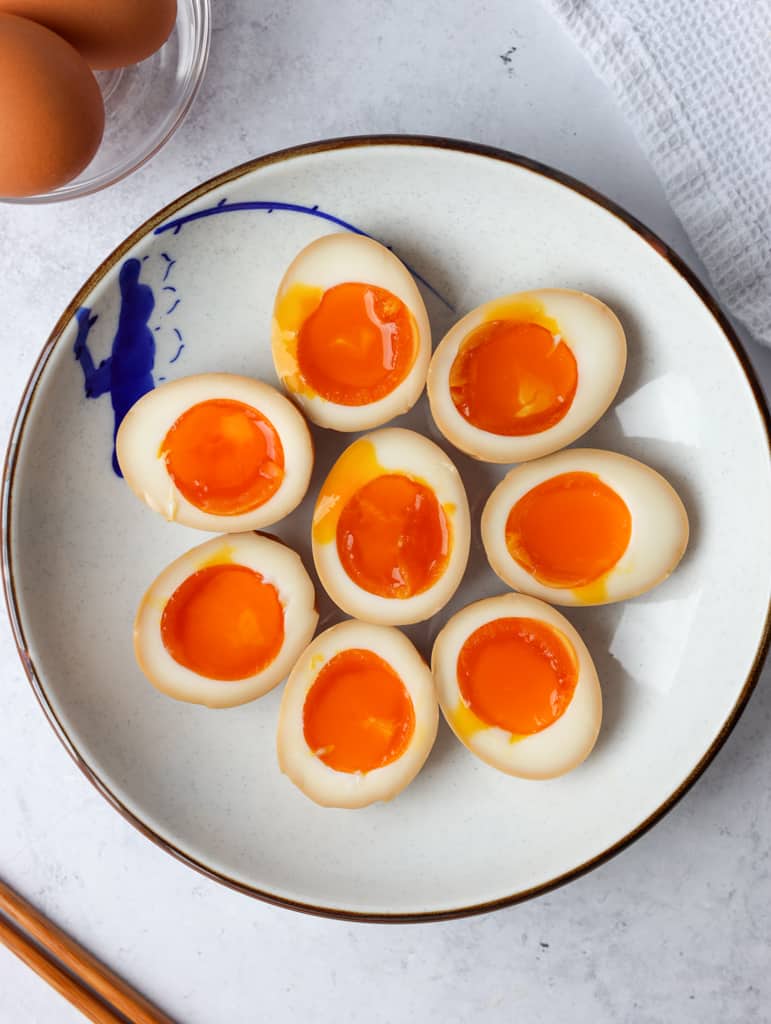
Ingredients & Substitutions
Please scroll down to the below recipe card for exact measurements.
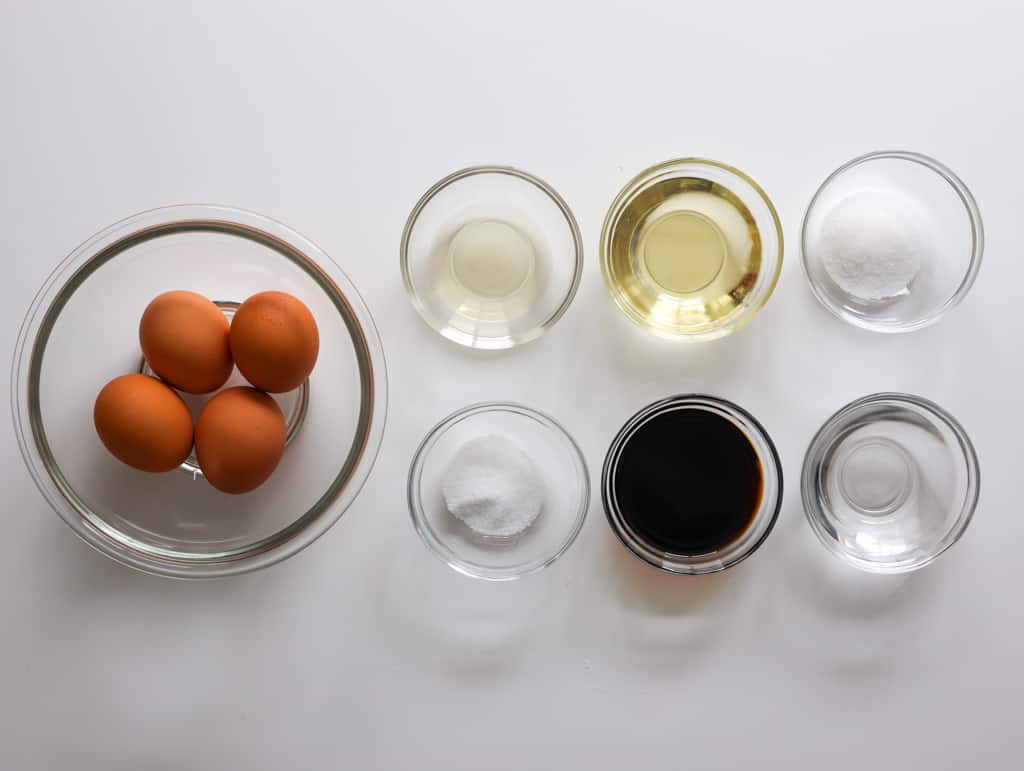
- Fresh Large Eggs: ideally room temperature eggs to avoid cracking the eggshells. Or bring them to room temperature by running cold eggs under warm water. Large Eggs are about 2 oz or 56.8 grams in weight and it's important to use large ones for the perfect jammy yolk.
- Avoid using extra-large eggs (2.25 oz or 63.8 g), medium eggs (1.75 oz or 49.6 g) or small eggs (1.5 oz or 42.5 g) as this will cause non-jammy eggs or very runny yolks.
- Salt & White Vinegar: or substitute with rice vinegar or apple cider vinegar to add to the boiling water (optional). The vinegar softens the calcium carbonate in the shell making it easier to crack and peel away. The salt prevents any cracked eggs from leaking into the boiling water.
Soy sauce marinade
- Regular soy sauce: or substitute with low sodium soy sauce or light soy sauce.
- Mirin: a sweet Japanese cooking wine that is sweeter than cooking sake and has a very low alcoholic taste. You can find this at most Asian or Japanese grocers. For a non-alcoholic version: substitute with non-alcoholic mirin or 4 tablespoon cold water + 3 drops of rice vinegar + ⅛ teaspoon white sugar.
- Cold water: to help dilute the soy sauce
- Sugar: or brown sugar to help balance out the salty flavors
Variations
- If you’re gluten-free, substitute the soy sauce with tamari sauce, coconut aminos or a gluten-free soy sauce of your choice.
Note: Most Asian grocers will carry these ingredients. You may find some at your select grocery store or online, like on Amazon.
Expert Tips
- Use room temperature eggs or bring cold eggs to room temperature by running them under warm water until the shells are not cold. When cold eggshells hit hot boiling water, it will easily crack the shell.
- Add salt and vinegar to the pot of water to make the egg peeling process easier!
- Transfer boiled eggs to an ice bath to stop the eggs from cooking.
- Crack and peel with the back of a spoon and start from the less pointy side of the egg as there's a little gap between the shell and the egg preventing you from digging into the egg white.
- Marinate eggs in the brine for 24 hours for best results.
- Use a sharp bladed knife to slice the eggs and avoid using notched-knife as this creates uneven marks or stay away from dull knives as this can squeeze the egg as you slice.
Instructions
Below are step-by-step instructions on how to make ramen eggs:
Prepare Marinade and Boil Water

In a mason jar or small air-tight container, combine marinade ingredients until the sugar fully dissolves. TIP: Microwave this for 30 seconds to help the sugar dissolve faster. Set aside.

In a small pot of water, add vinegar and salt. Boil water over high heat.
Boil eggs and transfer to ice bath

Once water reaches boiling point, carefully lower room temperature eggs. Reduce to medium high heat for a rolling boil. (If needed, bring cold eggs to room temperature by running them under warm to hot water until the shell is not cold). For soft boil eggs with a runny yolk, boil for 6 minutes or 6.5 minutes for a jammy yolk. For hard-boiled eggs, boil for 10 minutes.

Meanwhile prepare an ice water bath in a large bowl. Transfer cooked eggs into the ice bath to stop the cooking process. Do not just run them under cold water. Let them sit in the ice bath until the eggs have cooled down completely.
Remove egg shells and marinate eggs
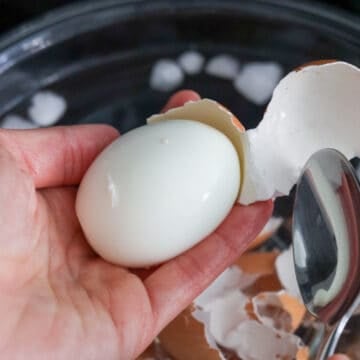
Gently crack and peel egg shells with the back of a spoon. Start by cracking from the bottom of the egg (the less pointy side) as there is a gap between the egg white and the shell. You can use your fingers to gently peel away the shell and then use the back of the spoon to lift the shell off. This prevents any finger nail marks in the egg whites. Important: Soft-boiled eggs require a gentler touch over hard-boiled eggs when cracking and peeling.
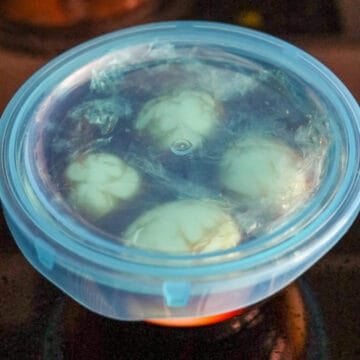
Carefully place cooked eggs into soy sauce marinade. Cover the container with a lid. Marinate overnight or for 24 hours for best results. The egg whites will began to stain at around the 2 hour mark if you're in a hurry to enjoy them. Tip: Place a small square of plastic wrap or paper towel over the eggs to further submerge them into the marinade.
Slice in half
Slice the eggs open with a sharp knife by slicing them down the middle. Enjoy cold! There's no need to reheat them.
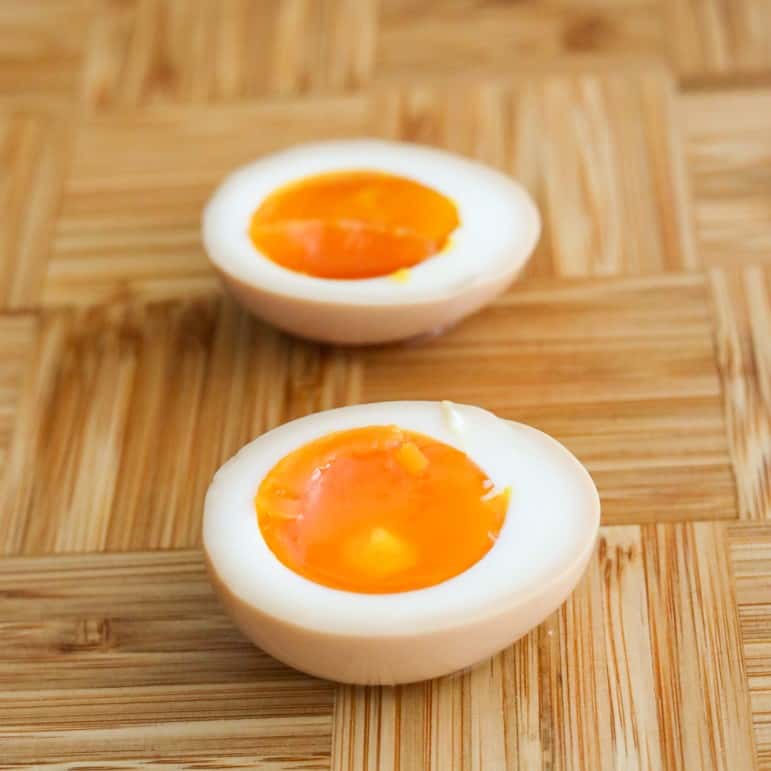
Storage
- Leftover marinated eggs will last up to 3 days stored in the fridge in the same airtight container with the marinade. By day 4, I would be cautious to consume, as the recipe requires a 24-hour marinating time which already counts as day 1. There's no need to reheat them and they can be enjoyed cold.
- Freezer-friendly? I don't recommend freezing ramen eggs as the egg texture will change.
Pairing Suggestions
I love enjoying these eggs on their own as a snack, with ramen noodles, white rice and veggies, on toast, or over a salad. I've also seen these eggs stuffed into the filling of an egg salad sandwich.
Can I Air Fry the Eggs?
I don’t recommend using the air fryer to prepare the eggs instead of boiling. The air frying process hardens the egg white making it taste chewier (especially hard boiled eggs) and preventing the marinade from dying the egg white evenly. See image below.
The peeling process is more difficult because the egg shells and membrane between the egg white and shell fuse together making it harder to peel. As a result, this can remove a lot of the precious egg white meat.
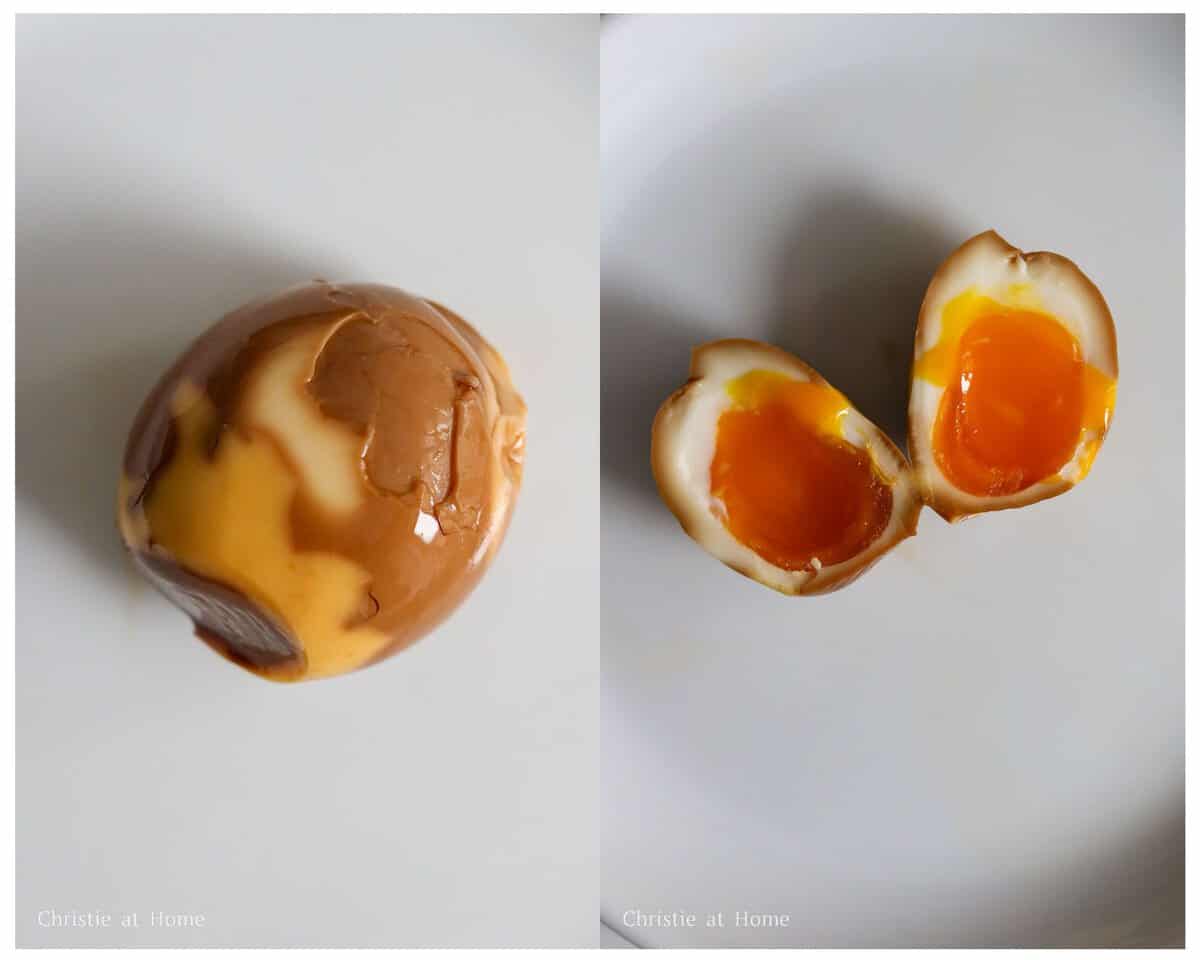
FAQ
The soy marinade can be repurposed for one more batch and is good for another 4 days as long as there isn't any egg yolk from the previous batch.
Yes, you can make these a day in advance and they will last up to 2 days stored in an airtight container in the fridge.
I wouldn't recommend re-heating them in the microwave that as this can cause the yolk to become overcooked and less jammy. However, you can allow the eggs to sit on hot water until they're warmed to your liking.
There are many ways to level up your ramen eggs and it all comes down to what you add into the marinade. Some suggestions include: minced garlic, grated ginger, green onions, sesame seeds, or chili oil.
Other recipes you may like
📖 Recipe

Easy & Simple Ramen Eggs
Ingredients
- 4 large room temperature eggs or bring them to room temperature by running cold eggs under warm water until shells are not cold
- 1 tablespoon white vinegar for boiling eggs to make peeling process easier (optional)
- 1 teaspoon salt for boiling eggs to make peeling process easier (optional)
Soy Sauce Marinade
- ¼ cup regular soy sauce or substitute with a gluten-free soy sauce, tamari sauce or coconut aminos
- ¼ cup mirin
- ¼ cup cold water
- 2 teaspoon white granulated sugar or sub with brown sugar
Instructions
- In a mason jar or small air-tight container, combine marinade ingredients until the sugar fully dissolves. TIP: You can microwave this for 30 seconds to help the sugar dissolve. Set aside.
- In a small pot of water, add vinegar and salt. Boil water over high heat.
- Once water reaches boiling point, carefully lower room temperature eggs. Reduce to medium high heat for a rolling boil and do not cover. For soft boil eggs with a runny yolk, boil for 6 minutes or 6.5 minutes for a jammy yolk. For hard-boiled eggs, boil for 10 minutes. Meanwhile prepare an ice water bath in a large bowl.
- Transfer cooked eggs into bowl of ice water to stop the cooking process. Do not just run them under cold water. Let them sit in the ice bath until the eggs have cooled down completely.
- Gently crack and peel egg shells with the back of a spoon. Start by cracking from the bottom of the egg (the less pointy side) as there is a gap between the egg white and the shell. You can use your fingers to gently peel away the shell and then use the back of the spoon to lift the shell off. This prevents any finger nail marks in the egg whites. Important: Soft-boiled eggs require a gentler touch over hard-boiled eggs when cracking and peeling.
- Carefully place cooked eggs into soy sauce marinade. Cover the container with a lid. Marinate overnight or for 24 hours for best results. The egg whites will began to stain at around the 2 hour mark if you're in a hurry to enjoy them. Tip: Place a small square of plastic wrap or paper towel over the eggs to further submerge them into the marinade.
- Slice the eggs open with a sharp knife by slicing them down the middle. Enjoy cold! There's no need to reheat them.






Darren
Yum
Christie Lai
Thanks Darren! Glad you enjoyed it 🙂
Stephanie
Made this to eat with our ramen dinner and wow! Is it delicious! Both my husband and I enjoyed it. I will be making more! I am wondering tho, how long is the marinade good for?
christieathome
Awesome! Thanks for making my recipe, Stephanie! The marinade will last up to 4 days as long as the egg yolk didn't leak into it.